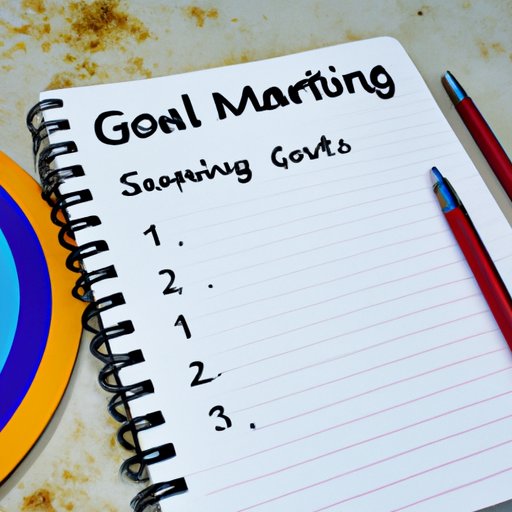Introduction
Goal setting is an essential part of any successful endeavor. It helps us stay focused on our objectives and provides us with a sense of purpose and direction. Goals also give us something to strive for and keep us motivated. But how do we go about setting effective goals?

Setting SMART Goals: How To Create Achievable Objectives
SMART stands for Specific, Measurable, Attainable, Relevant, and Time-Bound. This acronym is often used as a framework for creating achievable goals. Here’s what each letter in SMART stands for:
- Specific: Goals should be clear and concise.
- Measurable: Goals should have measurable progress.
- Attainable: Goals should be realistic and attainable.
- Relevant: Goals should be relevant to your overall mission.
- Time-bound: Goals should have a timeline and a deadline.
Examples of SMART goals include: “I will lose 5 pounds by the end of the month,” “I will save $500 by the end of the year,” and “I will read one book per week.”
Here are some steps for creating SMART goals:
- Identify your desired outcome: Ask yourself what you want to accomplish and why it’s important to you.
- Break down your goal into smaller tasks: Break down your goal into smaller, more manageable tasks.
- Set a timeline: Decide when you want to achieve your goal by.
- Track your progress: Keep track of your progress and adjust your plan accordingly.
- Reward yourself: Celebrate your successes and reward yourself for achieving milestones.

10 Goals You Can Set Now To Improve Your Life
Now that you know how to create SMART goals, here are 10 goals you can set now to improve your life:
Short-Term Goals
- Get organized: Create a system for organizing your home, office, or workspace.
- Eat healthier: Make small changes to your diet, such as eating more fruits and vegetables.
- Exercise regularly: Aim to exercise at least three times a week.
- Learn a new skill: Take a class or try something new.
- Read more: Set a goal to read a certain number of books in a month.
Long-Term Goals
- Start a business: Develop a business plan and start working towards your dream.
- Pay off debt: Create a budget and work towards becoming debt-free.
- Travel: Start saving up for a dream vacation.
- Save for retirement: Start contributing to a retirement account.
- Volunteer: Find an organization or cause that you’re passionate about and get involved.
A Guide to Setting Long-Term and Short-Term Goals
It’s important to understand the difference between long-term and short-term goals. Long-term goals are goals that require more time and effort to achieve. They typically involve larger projects, such as starting a business or saving for retirement. Short-term goals are smaller goals that are easier to achieve in a shorter period of time. Examples of short-term goals include reading a book, exercising regularly, or learning a new skill.
Benefits of Long-Term Goals
- Provides motivation: Long-term goals can help keep you motivated over the long haul.
- Gives you a sense of purpose: Having a long-term goal can give you a sense of purpose and direction.
- Encourages personal growth: Working towards a long-term goal can help you grow and develop as a person.
Benefits of Short-Term Goals
- Easier to stay motivated: Short-term goals are easier to stay motivated for because they don’t require as much time and effort.
- Helps you build momentum: Short-term goals can help you build momentum and make progress towards your long-term goals.
- Provides a sense of accomplishment: Achieving small goals can give you a sense of accomplishment and boost your confidence.
The Benefits of Setting Goals: Why It’s Important to Have Clear Objectives
Setting goals has many benefits, including improved focus, increased motivation, increased productivity, and increased self-confidence. Here are some of the benefits of setting goals:
Improved Focus
Having clear goals can help you stay focused on what’s important. When you know what you want to achieve, it’s easier to ignore distractions and stay on track.
Increased Motivation
Goals can provide a sense of purpose and serve as a source of motivation. Knowing what you want to achieve can help you stay motivated and push through difficult times.
Increased Productivity
Goals can help you prioritize tasks and stay organized. When you have a clear understanding of what needs to be done and when, it’s easier to stay productive.
Increased Self-Confidence
Achieving goals can give you a sense of accomplishment and boost your self-confidence. Seeing the progress you make towards your goals can be incredibly rewarding.
5 Steps To Take Before You Set Goals That Stick
Before you set goals, it’s important to take some time to reflect and make sure you’re setting goals that make sense for you. Here are five steps to take before you set goals that stick:
Clarify Your Values
Take some time to think about what’s important to you. What do you value most in life? What matters to you? Clarifying your values can help you determine what goals are worth pursuing.
Identify Your Priorities
Once you’ve identified your values, it’s time to identify your priorities. What goals are most important to you? What do you want to focus on first? Identifying your priorities can help you narrow down your goals and focus your energy.
Break Down Your Goals
Breaking down your goals into smaller, more manageable tasks can help make them seem less daunting. Breaking down your goals can also help you track your progress and stay motivated.
Make a Plan
Creating a plan of action can help you stay organized and on track. Write down your goals, deadlines, and tasks and make sure to review your plan regularly.
Track Progress
Tracking your progress can help you stay motivated and make adjustments as needed. Measure your progress against your goals and celebrate your successes.

How To Set Financial Goals That Make Sense For You
Setting financial goals can help you create a roadmap for your money. Here are some tips for setting financial goals that make sense for you:
Make a Budget
Creating a budget is a great way to get a clearer picture of where your money is going and how much you can save. Track your spending and create a budget that works for you.
Set Savings Goals
Creating a savings goal can help you stay motivated and on track. Whether you want to save for a house, a car, or retirement, setting a savings goal can help you reach your goal faster.
Invest in Your Future
Investing in stocks, bonds, or mutual funds can help you reach your long-term financial goals. Research different investment options and find one that makes sense for you.
Track Your Spending
Keeping track of your spending can help you stay on top of your finances. Use a budgeting app or spreadsheet to monitor your spending and make sure you’re staying on track.
7 Steps To Achieving Any Goal You Set
Achieving your goals is possible with the right mindset and approach. Here are seven steps to achieving any goal you set:
Visualize Your Goal
Visualizing your goal can help you stay motivated and focused. Spend some time visualizing what success looks like and how you’ll feel when you achieve your goal.
Write Down Your Goal
Writing down your goal can help you stay accountable and remind you of what you want to achieve. Writing down your goal also makes it real and tangible.
Break Your Goal Into Smaller Tasks
Breaking your goal into smaller tasks can help make it seem less daunting. Breaking your goal into smaller tasks can also help you track your progress and stay motivated.
Reward Yourself
Rewarding yourself for achieving milestones can help you stay motivated and on track. Celebrate your successes and don’t forget to reward yourself for all of your hard work.
Get an Accountability Partner
Having an accountability partner can help you stay on track and accountable. Find someone who shares similar goals and check in with them regularly.
Track Your Progress
Tracking your progress can help you stay motivated and make adjustments as needed. Measure your progress against your goals and celebrate your successes.
Celebrate Your Success
Celebrating your successes is an important part of goal setting. Taking the time to recognize your accomplishments can help you stay motivated and on track.
Conclusion
Setting goals is an important part of self-improvement. By following the steps outlined in this article, you can create SMART goals and take the necessary steps to achieve them. Remember to take the time to clarify your values, identify your priorities, break down your goals, make a plan, track your progress, and celebrate your successes. With the right approach, you can achieve any goal you set.
(Note: Is this article not meeting your expectations? Do you have knowledge or insights to share? Unlock new opportunities and expand your reach by joining our authors team. Click Registration to join us and share your expertise with our readers.)
